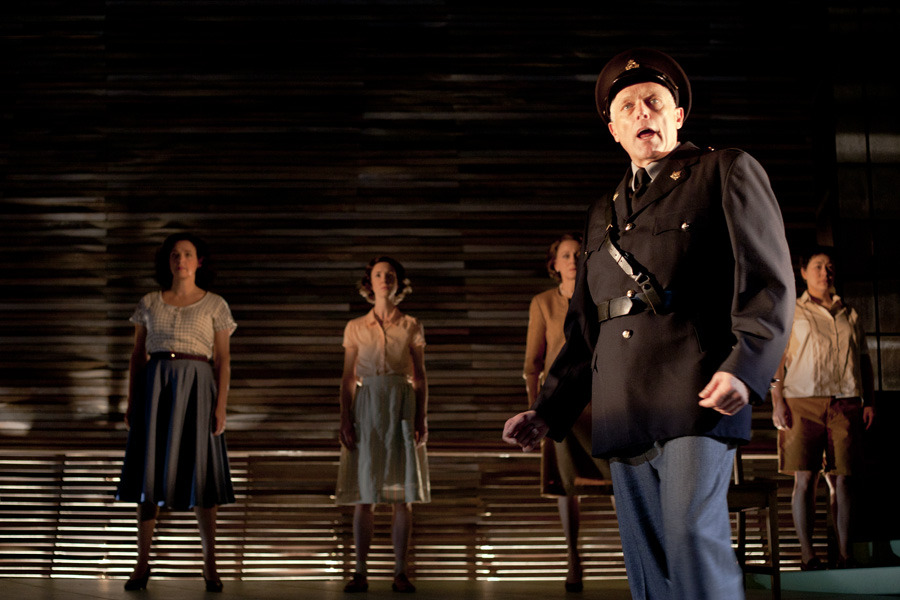Minute misfortunes, cringing incompetence, and wanton, inexplicable malevolence—that’s all one needs to hang a boy.
Steven Truscott’s case is a black stain on Canadian history. In response to the violent rape and murder of a child—12-year-old Lynne Harper—our neighbours, our courts, and our society took the life of another. Just 14-years old at the time, Truscott became in 1959 the youngest Canadian sentenced to death. That this was commuted to life imprisonment, and the executioner’s noose stayed, is hardly comforting. Truscott would have to wait until 2007—when the errors of the initial case could be brought to light—to be acquitted of the charges.
The Centaur Theatre/National Arts Centre co-production of Innocence Lost: A Play About Steven Truscott, written by Beverley Cooper and directed by Roy Surette, is an accomplished telling of the events surrounding Harper’s murder and Truscott’s trial. Cooper’s script rightly reflects the pain experienced not just by Truscott, but also the Harper family and the small, tightknit community of Clinton, Ontario in which the tragedy took place. This attentiveness, coupled with Surette’s even-handed and empathetic direction, makes for a production that is provoking without moralizing, inquisitive rather than inquisitorial, and very, very much alive.
This care is evident in the meticulous construction of an idyllic community, a space that is pristine, protected, perfect—a space without evil. The same care can be seen in the slow fragmentation of this safety, as Harper’s disappearance becomes a morbid, unimaginable discovery in the bushes, and as the community slowly turns to chew out and digest one of their own. The innocence that is lost is not merely Truscott’s—the story is very much about the suffering of a town and country.
Cooper merits praise for her dexterity in navigating such a horrible event, one in which various parties have incalculable emotional stakes. Many of the lines are narrations, breathlessly relaying facts to keep the audience informed of all relevant detail, but the cast handles the task, which could easily sink into tediousness, with livid yet restrained passion. The rest of the script dives deep into intersubjective experiences, whether it’s the gossipy neighbour, the traumatized classmate, or the cop that’s out for blood. Here, we see glimpses of what a clinical court document or aseptic news clipping could never reveal. The best moments of the production capture a back and forth of this dualism, a fusion of cool facts and heated humanity.
Technical elements also complement the respect and restraint which characterizes this production. James Lavoie’s tiered set design, replete with miniature houses, exhibits the power of subtlety. The same can be said for Luc Prairie’s lighting, though it is appropriately dramatic at select points, such as during Truscott’s appearance at the Supreme Court of Canada. The video projection which accompanies several scenes may easily have slid into uncomfortable sentimentality in less accomplished hands, but George Allister and Patrick Andrew Boivin’s design is compelling and effective without being self-indulgent.

Distinguishing themselves among a versatile and accomplished cast, most of whom play multiple roles, are Fiona Reid and Allan Morgan. Both veteran actors in Canadian theatre, Reid and Morgan’s talent is evinced by the range and depth of nuance in their characterizations. Each role inhabited is made unique, and even the briefest cameo, in the hands of Morgan, could become the most memorable performance of the night. As the guiding spirit for the audience, Sarah (Jenny Young) is a formidable presence. Young invests the role with both vulnerability and strength, making for an imminently relatable character that helps the audience through the wrenching story. The tightly-wound and immaculate production nevertheless saw a number of minor line mishaps on opening night—such things are, however, unlikely to mar future performances.
The subtle movement from ‘innocent until proven guilty’ to its terrifying inverse speaks to the injustice of Truscott’s case. Lines like “He’s got to be guilty! There’s too much at stake!” exhibit just why the conviction became one of the most infamous ‘miscarriages of justice’ in Canadian history. Yet there’s no condemnation or accusation in this production, no single ‘ah-ha!’ moment that the viewer can point to as the source of all wrong. There’s no target for one to strike with the red-hot poker of vengeance, nothing that can be used to console oneself with the thought that ‘if we stop that, we can prevent it from happening again.’ Instead, Truscott’s story is one overflowing with sadness, helplessness, and frustration. Though we may not answer this question, the fact that Innocence Lost asks it at all is important: What made us, governors and participants in our cherished democracy, turn so eagerly to condemn this boy?
Innocence Lost runs until Feb. 24 at the Centaur (453 Saint-François- Xavier). Student admission $26.










Thank you for this portrayal of such a wrenching case…how a young boy could be treated so ruthlessly by a justice system and a country bent on finding someone to blame for this tragic murder is beyond my comprehension. Finding someone guilty, making someone pay, was more important to the justice system of that time than finding the person who was truly responsible.
The saving grace is that Steve found his justice, albeit more than 48 years late, in a much-delayed happy ending for him and his family and friends who loved him through the years…no small salve on a wound that scored deeply to the heart of his being.
We cannot forget that this injustice is possible on any given day in any given town or city, and to any given child…this did happen to Steve in 1959, and it can easily happen to anyone today. There are people today who have been falsely accused and found guilty who are innocent, and they need our support and help just as Steve did.